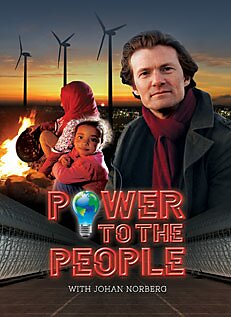A new documentary by Cato Senior Fellow Johan Norberg, shown recently on PBS stations nationwide, is a non-political look at the reality of the world’s energy problems. “Energy questions are complicated, and there are always trade-offs,” Norberg notes. While bringing electricity to many remote villages in India and the Sahara causes an increase in carbon emissions, it also allows families to have refrigeration for their food, electricity to light their homes and the time to develop their lives beyond working just to sustain themselves every day. “Don’t they deserve the same kinds of life changing benefits that power has brought the west?” Norberg asks.
This program explains how ALL sources of energy have their attributes and drawbacks. It will take large amounts of low-cost power to fuel economic development in the third world, while also keeping up with growth in the developed world. There is no “perfect” source to meet these needs: Coal and oil make up a third of the current world energy supply, so while the infrastructure is in place and works fairly inexpensively, these fossil fuels are consistently tagged as “dirty.” Natural gas is abundant and clean, and cheap and easy to use, but the means of getting to it (fracking) is controversial. Nuclear energy power is one of the only large-scale alternatives to fossil fuels, but nuclear accidents like Chernobyl and Three Mile Island have made the public wary. Hydro power is clean and fairly cheap, but dams have been targeted by environmentalist for harming fish populations. And, Norberg notes, most good sources of hydropower are already being utilized to their full capacity, leaving little chance to expand this resource. Solar power is clean and abundant, but it doesn’t work when the sun doesn’t shine, and the infrastructure to capture it is expensive. Wind supplies only one percent of energy globally because while it’s clean, it’s intermittent and doesn’t always come at the right velocity.
Norberg doesn’t make judgements, for the most part…except to say that top-down, government imposed “solutions” to the world’s energy problems have not worked yet, and are highly unlikely to suddenly start working.
This is an excellent program for people who really want to understand the basics of world energy needs. Watch it at Cato’s site here, and read more about the Free to Choose network here.

